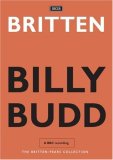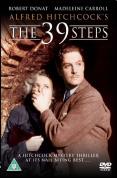![The 39 Steps [1935]](/pictures/1013072.jpg) The 39 Steps | DVD | (19/06/2007)
from £5.95
| Saving you £10.04 (168.74%)
| RRP
The 39 Steps | DVD | (19/06/2007)
from £5.95
| Saving you £10.04 (168.74%)
| RRP A high point of Hitchcock's pre-Hollywood career, 1935's The Thirty-Nine Steps is the first and best of three film versions of John Buchan's rather stiff novel. Robert Donat plays Richard Hannay, who becomes embroiled in a plot to steal military secrets. He finds himself on the run; falsely accused of murder, while also pursuing the dastardly web of spies alluded to in the title. With a plot whose twists and turns match the hilly Scottish terrain in which much of the film is set, The Thirty-Nine Steps combines a breezy suavity with a palpable psychological tension. Hitchcock was already a master at conveying such tension through his cinematic methods, rather than relying just on situation or dialogue. Sometimes his ways of bringing the best out of his actors brought the worst out in himself. If the scene in which Donat is handcuffed to co-star Madeline Carroll has a certain edge, for instance, that's perhaps because the director mischievously cuffed them together in a rehearsal, then left them attached for a whole afternoon, pretending to have lost the key. The movie also introduces Hitchcock's favoured plot device, the "McGuffin" (here, the military secret), the unexplained device or "non-point" on which the movie turns. --David Stubbs
![The 39 Steps [Blu-ray] [1935]](/pictures/1096249.jpg) The 39 Steps | Blu Ray | (19/10/2009)
from £9.98
| Saving you £12.00 (150.19%)
| RRP
The 39 Steps | Blu Ray | (19/10/2009)
from £9.98
| Saving you £12.00 (150.19%)
| RRP Alfred Hitchcock considered The 39 Steps to be one of his favourite films partly because it launched his classic theme of the innocent man on the run from villains and lawmen. Robert Donat stars as Richard Hannay in this freely adapted version of John Buchan's story. Despite repeated remakes Hitchcock's riveting original remains unequalled.
![R. Strauss: Der Rosenkavalier - Royal Opera House/Solti [1985]](/pictures/1033427.jpg) R. Strauss: Der Rosenkavalier - Royal Opera House/Solti | DVD | (23/02/2004)
from £20.00
| Saving you £-2.01 (N/A%)
| RRP
R. Strauss: Der Rosenkavalier - Royal Opera House/Solti | DVD | (23/02/2004)
from £20.00
| Saving you £-2.01 (N/A%)
| RRP Strauss' dazzling opera Der Rosenkavalier set in 1740's Vienna combines farce romance and a world of weary acknowledgement of getting older. It features some of the most gorgeous music ever written for the female voice.
![Britten: Death In Venice [1989]](/pictures/1028690.jpg) Britten: Death In Venice | DVD | (28/02/2001)
from £22.15
| Saving you £2.84 (12.82%)
| RRP
Britten: Death In Venice | DVD | (28/02/2001)
from £22.15
| Saving you £2.84 (12.82%)
| RRP Britten's last opera, Death in Venice will always be associated with the two voices for which the major parts in it were written. It is the achievement of Robert Tear and Alan Opie, in this magisterial performance by Graeme Jenkins with the Glyndebourne touring company, to produce telling performances that are entirely separate from our memories. Tear's Aschenbach is more bull-like than Peter Pears' moralist dreamer; his drift into sentimental eroticisation of the boy Tadzio upsets him as much for the weakness it reveals as for the collapse of his virtue. Alan Opie is as much of a virtuoso as John Shirley-Quirk in the multiple roles that culminate in the corrupting voice of Dionysus--the hotelier who persuades Aschenbach to stay, the barber who gives him a toupee and paints his face, the street entertainer, the rake who flirts with sailors; the otherworldly counter-tenor of Michael Chance is spookily right as Apollo. The scenes for dancers manage to be at once dreams of the erotic and plausible adolescent sea-side wrestling; the direction by Stephen Lawless and Martha Clarke manages to capture the mistiness of the piece from which fate and strangeness suddenly emerge. On the DVD: The DVD has subtitles in German, French and Spanish, as well as an acoustic which brings out the subtleties of Britten's string, brass and percussion in this difficult work. --Roz Kaveney
![The 39 Steps [1935]](/pictures/1013382.jpg) The 39 Steps | DVD | (01/10/1999)
from £23.73
| Saving you £-7.74 (N/A%)
| RRP
The 39 Steps | DVD | (01/10/1999)
from £23.73
| Saving you £-7.74 (N/A%)
| RRP Hitchcock's first great romantic thriller is a prime example of the "macguffin" principle in action. Robert Donat is Richard Hannay, an affable Canadian tourist in London who becomes embroiled in a deadly conspiracy when a mysterious spy winds up murdered in Hannay's rented flat--and both the police and a secret organisation wind up hot on his trail. With only a seemingly meaningless phrase ("the 39 steps"), a small Scottish town circled on a map, and a criminal mastermind identified by a missing finger as clues, quick-witted Hannay eludes police and spies alike as he works his way across the countryside to reveal the mystery and clear his name. At one point he finds himself making his escape manacled to blonde beauty Pamela (Madeleine Carroll), whose initial antagonism is smoothed by Hannay's charm. It's classic Hitchcock all the way, a seemingly effortless balance of romance and adventure set against a picturesque landscape populated by eccentrics and social-register smoothies, none of whom is what he or she appears to be. Hitchcock would play similar games of innocents plunged into deadly conspiracies, most delightfully in North by Northwest, but in this breezy 1935 classic, Hitch proves that, as in any quest, the object of the search isn't nearly as satisfying as the journey. --Sean Axmaker, Amazon.com
 Britten - Billy Budd - Mackerras | DVD | (09/06/2008)
from £N/A
| Saving you £N/A (N/A%)
| RRP
Britten - Billy Budd - Mackerras | DVD | (09/06/2008)
from £N/A
| Saving you £N/A (N/A%)
| RRP 1. Britten: Billy Budd - Opening Credits 2. I Am An Old Man Who Has Experienced Much 3. Pull My Bantams! 4. Boat Ahoy! 5. I Heard Your Honour! 6. Christ The Poor Chap! 7. Boy! My Compliments To Mr. Redburn 8. Any Danger Of French Notions Spreading This Side Sir? 9. We Are Sir. Claggart Is An Able One 10. Land On The Port Bow Sir 11. Blow Her Away Blow Her To Hilo 12. Come Along Dansker And Sing 13. O Beauty Handsomeness Goodness 14. Come Here. Remember Your Promise 15. Billy! Hist! Billy Budd! 16. Dansker Old Friend Glad To See You 17. I Don't Like The Look Of The Mist Mr. Redburn 18. This Is Our Moment 19. There You Are Again Master-At-Arms 20. O This Cursed Mist 21. Claggart John Claggart Beware! 22. The Mists Have Cleared 23. William Budd You Are Accused By Captain Vere 24. I Accept Their Verdict 25. Look! Through The Port 26. Here! Baby! Dansker Old Friend 27. Interlude 28. According To The Articles Of War 29. We Committed His Body To The Deep 30. Britten: Billy Budd - Closing Credits
![Puccini: Turandot -- Vienna PO/Gergiev [2002]](/pictures/1028336.jpg) Puccini: Turandot -- Vienna PO/Gergiev | DVD | (23/06/2003)
from £N/A
| Saving you £N/A (N/A%)
| RRP
Puccini: Turandot -- Vienna PO/Gergiev | DVD | (23/06/2003)
from £N/A
| Saving you £N/A (N/A%)
| RRP Puccini's 'Turandot' as directed by David Pountney. His production is based on the idea of fear of civilisation: the fear that the fatal combination of rapid technological progress gradually spinning out of control and inhuman political systems poses a fundamental threat to all human values.
 Mozart - Idomeneo - Britten | DVD | (09/06/2008)
from £34.66
| Saving you £-19.67 (N/A%)
| RRP
Mozart - Idomeneo - Britten | DVD | (09/06/2008)
from £34.66
| Saving you £-19.67 (N/A%)
| RRP This DVD is part of the Britten-Pears DVD Collection. This collection features four historically and musically significant films from the BBC archives of works and performances by Benjamin Britten and Peter Pears one of the greatest English tenors and Britten's long-term partner and artistic inspiration. None of these films have been available before on any home video format. This colour film recording of Mozart's Idomeneo dates from a period when Mozart's first mature masterpiece was barely known. This may indeed be the first-ever film of the opera. Conducted by Benjamin Britten using his own performing edition the opera is sung in English with Peter Pears singing Idomeneo - the only film recording with Peter Pears in the title role. The cast also includes renowned British soprano Heather Harper and a young Robert Tear. Each act begins with a spoken introduction from John Warrack revered music historian and academic.
 The 39 Steps | DVD | (27/02/2006)
from £19.99
| Saving you £-14.00 (N/A%)
| RRP
The 39 Steps | DVD | (27/02/2006)
from £19.99
| Saving you £-14.00 (N/A%)
| RRP Alfred Hitchcock considered The 39 Steps to be one of his favourite films partly because it launched his classic theme of the innocent man on the run from villains and lawmen. Robert Donat stars as Richard Hannay in this freely adapted version of John Buchan's story. Despite repeated remakes Hitchcock's riveting original remains unequalled.

Please wait. Loading...
This site uses cookies.
More details in our privacy policy